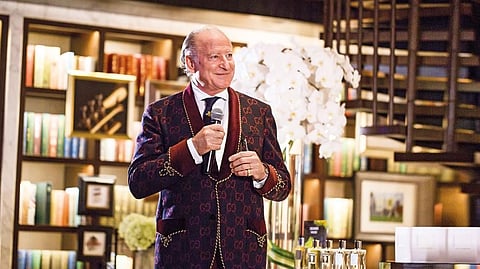The master perfumer's scented secrets
Spanish perfumer Alberto Morillas, who has helmed some of the world’s most iconic scents and was in Dubai to launch his brand Mizensir in the Middle East, tells Sangeetha Sagar why it’s important to allow emotions to be your guide, and why perfume should be gender-less

What inspired your journey into the world of perfumes?
When I started my studies in Geneva, I got to know a little bit more about perfumes and especially about the person behind each creation. I had read an article where Jean Paul Guerlain explained how to create a fragrance and that was a revelation for me!
Your three favourite scents?
Everything that brings me back to my origins and to Andalusia – roses, orange blossoms and jasmine.
The smell you dislike the most?
I would say garlic and onions, they have a smell so strong, it takes over everything else. Oh, and barbecue.
You have created over 7,000 perfumes. Where do you find inspiration for your scents?
Mostly, simple ideas of everyday life. What nature offers us according to the seasons, a reading, an encounter or a discussion. All these give me an emotion that leads to a formula.
What’s an average day like for you?
I wake up every morning at 6.30. The day starts with a cup of coffee. In general, I work on my formulas first at home. I send the modifications to my assistants so that when I get to the laboratory, the new formulas are ready. I never come home late in the evening, but I always bring work with me. I like to go back to my formulas one last time before going to bed. And I travel at least once a week to meet with my different clients or for my brand, Mizensir – all this saves me from having too much routine.
How long does it take to create a scent?
It always depends on the project and the client. This may vary from a few weeks to 3 years.
What are the greatest challenges you face when creating a scent?
When I work for clients, the biggest challenge is to immerse myself into the culture of the brand and understand the expectations of the director and in the end not to disappoint loyal customers. What is relevant for one brand will not work for another.
Why are scents always attributed to a specific gender? Do you think this should continue?
It’s a marketing thing. It’s easier to target the audience by giving a genre to a perfume. Personally, I don’t see perfumes in binary terms – men/women. Everyone appropriates the scents that give them an emotion. It can be a tuberose or a rose for a man. Or incense for a woman. Actually, there is a tendency at the moment not to clearly distinguish perfumes in terms of gender. Brands are giving more and more freedom of decision to the client.
What is your top tip for selecting the perfect scent?
Perfumes must bring happiness. That’s my motto. I would therefore advise anyone to let their emotions guide them. Smell a lot, be curious. And don’t just smell the best sales that all salespeople want you to discover.
What do Dubai and the region usually look for in scents?
In Dubai, people have been fragrance connoisseurs for a very long time, long before Westerners. They are therefore looking for products of superior quality with a strong olfactory signature. And above all, long-lasting ones.
What do you think are the scent trends of the future?
I don’t have a crystal ball about global trends in perfumery, but my creative projects will be influenced by the new molecules developed by [Swiss fragrance and flavour company] Firmenich. This always gives me new colours to add to my creative palette. It is always very exciting to learn to master these new materials.




